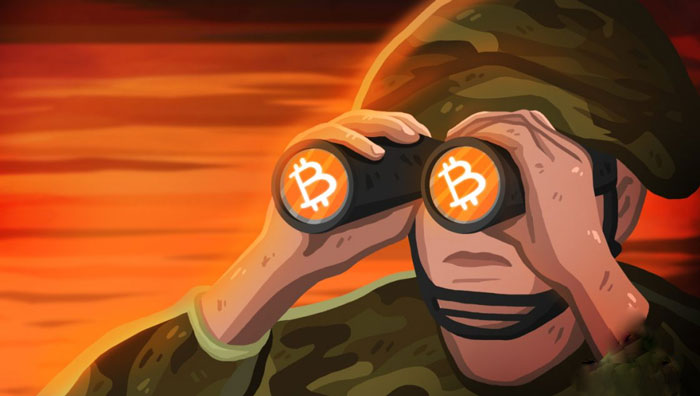
Generation Z rebelled against the state system: young people created a special formation, theyempty bank accounts of private corporations, convert stolen money into bitcoins and restore justice as noble robbers.
This is not the plot of a futuristic film, buta real-life war game developed by the US Department of Defense. The Pentagon leadership likes to conduct exercises with modeling of various situations that, in their opinion, could happen in real life.
One such scenario was published last yearFriday by The Intercept. What is the essence of the game, who are its main characters and what role do cryptocurrencies play in all this - read in our material.
Zbellion Rebellion Is 'Planned' For Mid-2020s
Thanks to the Freedom of Information Act,Journalists received a document according to which the US Department of Defense, back in 2018, developed a strategic program for the joint training of the country’s ground, air and sea forces called JLASS (Joint Land, Air and Sea Strategic). The program was tested in practice by cadets and teachers of US military colleges, where future generals and admirals are trained.
The 200-page document containsseveral stories played out within JLASS. These include the intensification of Islamist militants, anti-capitalist extremists, successors to ISIS, and so on. According to the plans of the military ministers, each of the stories is designed to reflect “a plausible representation of the development of situations under the influence of certain events and their impact on the situation in various regions of the world.”
Of particular interest to journalists was modeling.the following situation: in 2025, opposition-minded youth, the so-called generation Z (those who were born between 1997 and the present), begin a protest movement against the state system.
Events unfold gradually.Small groups of young people gather in parks and cafes and organize protests - first in Seattle, then in New York, Washington, Los Angeles, Las Vegas and Austin. Later, all this develops into a mass movement called Zbellion (rebellion - “rebellion” and generation Z). Its members are launching a “global cyber campaign to expose injustice and corruption and promote processes they see as beneficial.”
Recruits at Joining Zbellioninstructed mentors face to face. They are instructed to visit Darknet sites, gain access to sophisticated malware and, with their help, steal funds from corporations, financial institutions and non-profit organizations that support the "powers that be." Further, these funds are converted into bitcoins and distributed among the "worthy", including the members of Zbellion themselves, who need financial support.
According to the scenario, the organizers of the movement assureparticipants that law enforcement agencies will not be able to track such a Robin Hood-style redistribution of funds. Moreover, they argue that the insurgents' actions are "ultimately legal" because targets for hacking attacks are chosen based on a "private vote of online delegates."
Although Zbellion originated in America, by the endIn the 2020s, his activities are celebrated in Europe, Africa, Asia and the Middle East, that is, literally throughout the planet. The movement's most militant members have essentially taken it upon themselves to privately tax large corporations and other institutions to combat income inequality—as the script's writers put it, "insurgents use the cyber world to spread calls for anarchy."
The main characters of the uprising and its causes
According to the scenario, many representativesGeneration Z were psychologically traumatized in childhood by the events of 9/11 and the global economic crisis. Having matured, they felt crushed under the weight of the circumstances of the surrounding reality. Young people have lost hope for a good life and are convinced that the state system is set against them.
This is how the origins of the rebellion are described in the document:
"The terrorist attacks of September 11 and the GreatThe recession has equally impacted Generation Z growing up in the United States, leaving them feeling anxious and insecure. Although millennials also experienced these events, they were already in adulthood. Whereas Generation Z perceived what was happening as part of their childhood - as a real reality that influenced their worldview… many found themselves in excessive debt to pay for their education when they discovered that their employment options did not meet their expectations.
Generation Z is often described as peoplestriving for independence and new opportunities. However, they are less likely than others to believe in the “American dream” and believe that the system is opposed to them. Often they see themselves as catalysts for social change, they crave realization and excitement in their work to help “move the world forward.” Despite the technological skills they possess, Generation Z actually prefers personal contact rather than online interaction. They describe themselves as being involved in virtual and material communities and as rejecting excessive consumerism. ”
Is such a scenario likely?
It’s interesting that information about JLASS hit the mediajust during a period of extremely unstable situation in the United States. In light of recent events unfolding in the country following the death of African-American George Floyd at the hands of police, the plot of this game looks quite real. People rose up against racism and police brutality.
Peaceful stocks quickly grew into massriots with arson and looting, covering almost the entire country. The National Guard is already deployed in various places, and part of the active forces has been sent to the Washington, DC area by order of the Trump administration to forcibly suppress the protests. The situation really echoes the above scenario, or rather, with its beginning. What will happen next is difficult to predict.
Why Bitcoin?
In one of the materials we already wrote that inIn the coming decades, more than $68 trillion of US capital will pass into the hands of millennials (Generation Y), and from them, accordingly, to that same generation Z. Let us recall that, according to research by Provoke Insights, 43% of millennials trust cryptocurrencies more than stock markets, and 71% are ready to buy digital assets if a law on their full legalization is adopted.
Since the change of generations always helps accelerate innovation, it is reasonable to assume that children of millennials will perceive cryptocurrencies as an integral part of their lives.
The editor shares the same view.project In Bitcoin We Trust Sylvain Saurel. He believes that Generations Y and Z have a positive view of cryptocurrency and is confident that “Generation Z will be the first to fully benefit from Bitcoin without even thinking about it.”
That is, digital assets for today's youth will become the same everyday reality that computers, mobile phones and the Internet have become for millennials - they will take them by default.
What role do cryptocurrencies play during protests
Based on the fact that the Pentagon for its gamescreates scenarios that are as close as possible to reality, it can be judged that bitcoin was not chosen at random as a means of calculation in JLASS. Surely the military analyzed more than one situation with mass protests around the world and concluded that rebels are much more comfortable and profitable to use cryptocurrency in their activities than fiat money.
- Firstlyfinance the process, as well as receivedonations are easier and safer in digital assets, including BTC. Although it is possible to guarantee complete anonymity when making transactions on a Bitcoin network only using cryptomixers, it is still several times higher than when making bank transfers, where the participants in the transaction are visible in full view. This property of bitcoin causes conflicting opinions about it. Critics are confident that in this way, Bitcoin attracts criminals, terrorists and other offenders, allowing them to commit unlawful acts and go unpunished. However, crime and terrorism existed and actively manifested themselves long before the advent of digital money. At the same time, numerous supporters of the first cryptocurrency, including Anthony Pompliano, co-founder of Morgan Creek Digital, believe that the "impossibility of capturing" bitcoin is becoming increasingly attractive in times of geopolitical crisis.
- Secondly, the principles of the protest participants are largelycoincide with the principles that crypto enthusiasts adhere to. Many modern protest movements do not have clearly defined leaders, just as there are none in the Bitcoin environment. And it is quite logical that these two phenomena began to go hand in hand. The unity of people in protests occurs primarily due to the unity of their values and goals, and to coordinate actions they often use messengers with end-to-end encryption, for example, Telegram, Bridgefy and FireChat (the latter two work even without the Internet). A striking example of mass protests without clear leaders is the Yellow Vest Movement in France. The principles adopted by the protesters, based on decentralization, can make such movements very popular. And this in turn could change the geopolitical landscape forever.
- Thirdly, cryptocurrencies during protests mayused as a defensive asset, some kind of offshore zone, or even as a way to undermine the existing financial system. For example, the same “Yellow Vests,” among other things, called on people to withdraw money from banks and buy bitcoins. A similar situation with an uprising against increasing tariffs for the population occurred in Chile. Then the rioters burned several banks and destroyed almost 1,000 ATMs. During these events, the demand for Bitcoin almost doubled.
Today you can bringThere are many examples of decentralized protest movements. And even though not every one of them achieves their goals, one way or another they all contribute to the mass popularization of Bitcoin and blockchain technology.
Well, in conclusion, we can say that cryptocurrencies are serious and for a long time, even if the Pentagon considers bitcoin as an element of the script for its teachings.
</p> 5
/
5
(
1
voice
)





